Contents
| |
1574 • 1575 •1576 • 1577 • 1578 |
| Decades: |
| See also: History of Macau |
| |||||
| Decades: | |||||
|---|---|---|---|---|---|
| See also: | Other events of 1576 History of Macau | ||||
Events from the year 1576 in Portuguese Macau .
| |
1574 • 1575 •1576 • 1577 • 1578 |
| Decades: |
| See also: History of Macau |
| |||||
| Decades: | |||||
|---|---|---|---|---|---|
| See also: | Other events of 1576 History of Macau | ||||
Events from the year 1576 in Portuguese Macau .
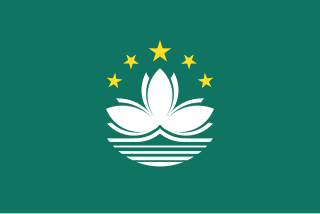
Macau or Macao is a special administrative region of the People's Republic of China (PRC). With a population of about 710,000 people and a land area of 32.9 km2 (12.7 sq mi), it is the most densely populated region in the world.
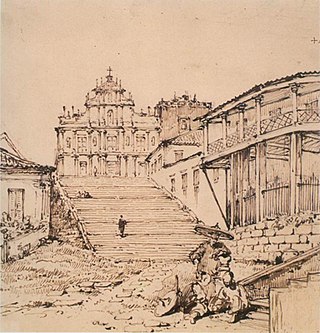
Macau is a special administrative region (SAR) of the People's Republic of China. It was leased to Portugal in 1557 as a trading post in exchange for a symbolic annual rent of 500 tael. Despite remaining under Chinese sovereignty and authority, the Portuguese came to consider and administer Macau as a de facto colony. Following the signing of the Treaty of Nanking between China and Britain in 1842, and the signing of treaties between China and foreign powers during the 1860s, establishing the benefit of "the most favoured nation" for them, the Portuguese attempted to conclude a similar treaty in 1862, but the Chinese refused, owing to a misunderstanding over the sovereignty of Macau. In 1887 the Portuguese finally managed to secure an agreement from China that Macau was Portuguese territory. In 1999 it was handed over to China. Macau was the last extant European territory in continental Asia.
Politics of Macau is a framework of a politically constrained multi-party presidential system, dominated by the People's Republic of China. It includes the legislature, the judiciary, the government, and a multi-party system. Executive power is exercised by the government, led by the Chief Executive.
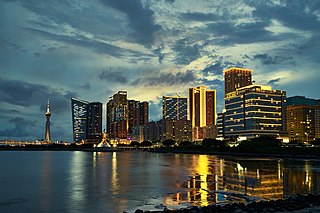
The economy of Macau is a highly developed market economy. Macau's economy has remained one of the most open in the world since its handover to China in 1999. Apparel exports and gambling-related tourism are mainstays of the economy. Since Macau has little arable land and few natural resources, it depends on mainland China for most of its food, fresh water, and energy imports. Japan and Hong Kong are the main suppliers of raw materials and capital goods. Although Macau was hit hard by the 1997–98 Asian financial crisis and the early 2000s recession, its economy grew approximately 13.1% annually on average between 2001 and 2006. Macau is a full Member of the World Trade Organization. Public security has greatly improved after handover to the People's Republic of China. With the tax revenue from the profitable gambling industry, the Macau government is able to introduce the social welfare program of 15 years of free education to all Macau citizens. In 2015, Macau's economy saw a sharp decrease due to the reduced spending by visitors from Mainland China since the Anti-corruption campaign under Xi Jinping.

The special administrative regions (SAR) of the People's Republic of China are one of four types of province-level divisions of the People's Republic of China directly under the control of its Central People's Government, being integral areas of the country. As a region, they possess the highest degree of autonomy from China's central government. However, despite the relative autonomy that the Central People's Government offers the special administrative regions, the National People's Congress and its Standing Committee remain capable of enforcing laws for the special administrative regions.

"Mainland China", also referred to as "the Chinese mainland", is a geopolitical term defined as the territory under direct administration of the People's Republic of China (PRC) in the aftermath of the Chinese Civil War. In addition to the geographical mainland, the geopolitical sense of the term includes islands such as Hainan, Chongming, and Zhoushan. By convention, territories outside of mainland China include:
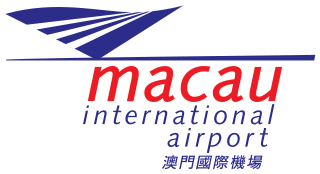
Macau International Airport is an international airport in the special administrative region of Macau, situated at the eastern end of Taipa island and neighbouring waters. It opened for commercial operations on 9 November 1995, during Portuguese administration of the region.

Taipa is an area in Macau, connected to Coloane through the area known as Cotai, which is largely built from reclaimed land. Located on the northern half of the island, Taipa's population is mostly suburban. Administratively, the boundaries of the traditional civil parish Freguesia de Nossa Senhora do Carmo are mostly coterminous with that of the former Taipa Island, except for a portion of the parish that lies on the island of Hengqin (Montanha), housing the campus of the University of Macau.

The Macanese pataca or Macau pataca is the currency of Macau. It is subdivided into 100 avos, with 10 avos called ho (毫) in Cantonese.
The Macau national football team represents the Chinese special administrative region of Macau in international association football. The team is supervised by the Macau Football Association. The Macau football team has a ranking that is one of the lowest among the FIFA members.

Air Macau is the flag carrier of Macau. It operates services to 24 destinations in Mainland China, Indonesia, Japan, Singapore, South Korea, Taiwan, Thailand and Vietnam, from the airline's home base at Macau International Airport. In 2014, Air Macau carried 2.12 million passengers with an average load factor of 68.20% and carried 15,900 tonnes of cargo and mail.
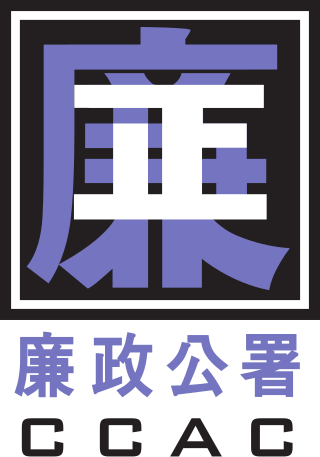
The Commission Against Corruption is the statutory independent anti-corruption body of Macau with the primary objective of combating corruption, bribery, and other illicit activities in both the public and private sectors. Established in 1999 under the Article 59 of the Macau Basic Law, the CCAC is headed by the Commissioner, who reports directly to the Chief Executive of Macau.

The Macau Grand Prix is an annual motorsport road racing event for automobiles and motorcycles held on the Guia Circuit in Macau. The event includes the Formula Regional and Motorcycle Grand Prix title races, with other races for touring, grand touring and sports cars.

The Macao Special Administrative Region of the People's Republic of Chinapassport is a passport issued to Chinese citizens who are permanent residents of the Chinese Special Administrative Region of Macau.
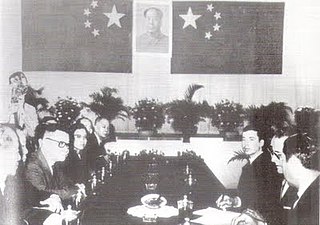
The 12-3 incident was a series of political demonstrations and riots against Portuguese colonial rule in Macau which occurred on December 3, 1966. The incident, inspired by the Cultural Revolution in the People's Republic of China, occurred as a direct response to a violent police crackdown by colonial authorities against local Chinese protesters demonstrating against corruption and colonialism in Macau.

The Government of the Macau Special Administrative Region allows citizens of specific countries/territories to travel to Macau for tourism or business purposes for periods ranging from 14 to 180 days without having to obtain a visa. For other entry purposes, such as establishing residence on a long-term basis, a different policy applies.

The Guia Circuit, or Circuito da Guia, is a 6.120 km (3.803 mi) street circuit located at the southeast region of the Macau Peninsula in Macau. It is the venue of the Macau Grand Prix, Macau Motorcycle Grand Prix and the Macau Guia Race. The circuit consists of long straights and tight corners, and features the characteristics of a typical street circuit - narrow, bumpy and limited overtaking opportunities. However, there are two special features that can rarely be found in other street circuits - variation in altitude and an ultra long main straight that allows top speed of 260 km/h (160 mph) on Formula Three cars. As a result, the circuit is recognised as one of the most challenging circuits in the world in terms of both driving and tuning, as cars have to maintain competitive speed to overcome hill-climbing, twisty corners and long straights in a single lap.
This article details the fixtures and results of the Macau national football team.

Macau was a Portuguese colony from the establishment of the first official Portuguese settlement of Macau in 1557 to its handover to China in 1999. It comprised the Municipality of Macau and the Municipality of Ilhas. Macau was both the first and last European holding in China.
The COVID-19 pandemic in Macau was a part of the ongoing worldwide pandemic of coronavirus disease 2019 caused by severe acute respiratory syndrome coronavirus 2. The first known case of the disease in the special administrative region of China was confirmed on 22 January 2020. The city saw nine more cases by 4 February, but no more cases until 15 March, when imported cases began to appear. Stringent government measures have included the 15-day closure of all 81 casinos in the territory in February 2020; in addition, effective 25 March, the territory disallowed connecting flights at its airport as well as entry by all non-residents, and from 6 April, the Hong Kong–Zhuhai–Macau Bridge was closed to public transport and most other traffic.